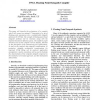Free Online Productivity Tools
i2Speak
i2Symbol
i2OCR
iTex2Img
iWeb2Print
iWeb2Shot
i2Type
iPdf2Split
iPdf2Merge
i2Bopomofo
i2Arabic
i2Style
i2Image
i2PDF
iLatex2Rtf
Sci2ools
124
click to vote
FCCM
2009
IEEE
2009
IEEE
FPGA Floating Point Datapath Compiler
This paper will describe the architecture of a compiler which will convert an untimed C description of a set of floating point expressions into a synthesizable datapath optimized for FPGAs. The concept of floating point fused datapath synthesis will be reviewed, along with the expected functional efficiency gains. The dataflow graph structure used by the compiler will be detailed, followed by the description of the restructuring and optimizations, as well as the required data integrity considerations. In particular, datapath architecture considerations for improved FPGA fitting will be explored. Application examples for a matrix calculation will be used to illustrate the improvements of the compiled datapath compared to the traditional core based approach, and the mechanisms behind them.
| Added | 20 May 2010 |
| Updated | 20 May 2010 |
| Type | Conference |
| Year | 2009 |
| Where | FCCM |
| Authors | Martin Langhammer, Tom VanCourt |
Comments (0)

